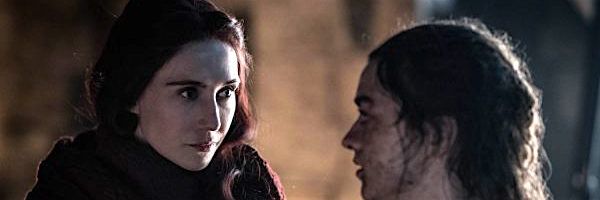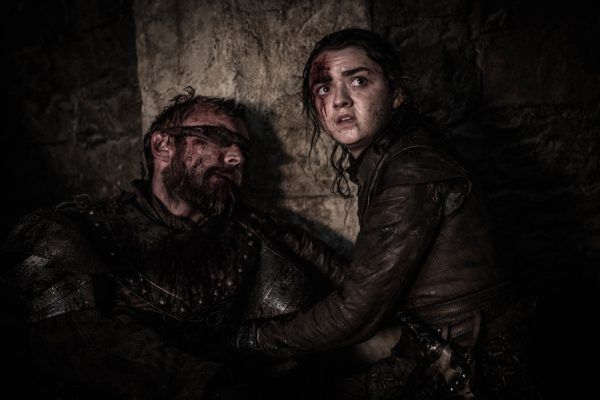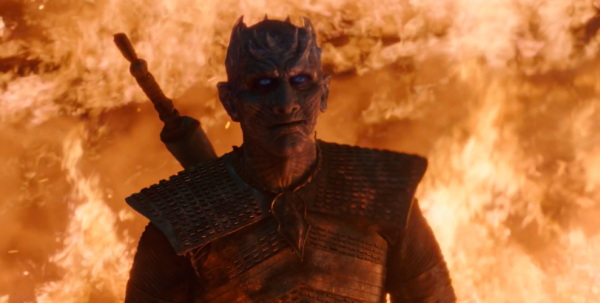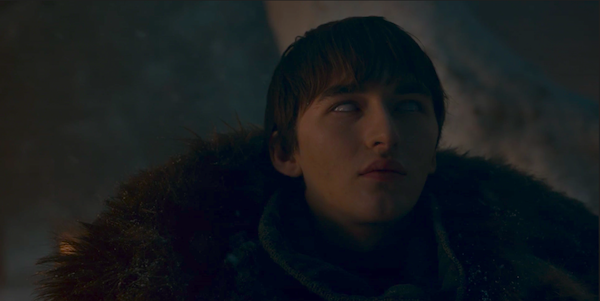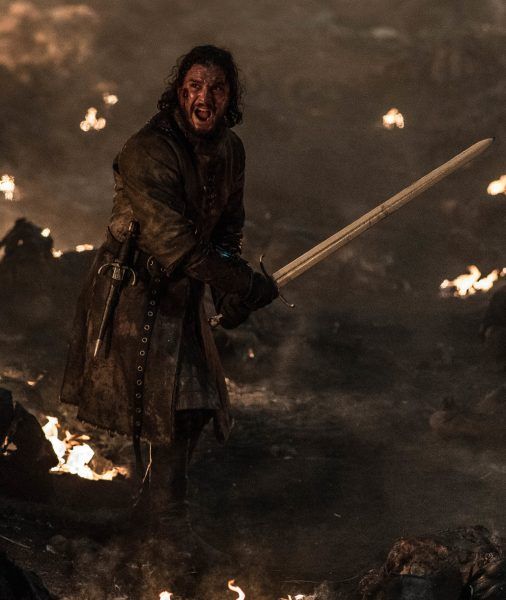First comes the obligatory disclaimer: Game of Thrones is an event series, it’s incredibly fun to watch, and the horror and tension that director Miguel Sapochnik was able to leverage in Season 8’s third episode, “The Long Night,” was absolutely outstanding. But there was one element of this epic, long-awaited battle episode written by Dan Weiss and David Benioff that felt half-baked, because the HBO series has never fully leaned in to the lore of George R.R. Martin’s A Song of Ice and Fire.
What makes Game of Thrones fundamentally different from a historical reimagining of the War of the Roses is magic. Dragons and ice zombies — the latter of which were introduced in the very first scene in the show and in George R. R. Martin’s books — caught people’s attention. This is a fantasy series after all, a high fantasy series where magic plays a key role in understanding the world. I’ve written before about how the series started downplaying the role of magic in Westeros and beyond with its sidelining of the direwolves, but there are many other key examples. In the books, the resurrection magic that brought Jon Snow back tied into a much more in-depth exploration of the religion of R’hllor, the Lord of Light—a prominent deity for the people of Essos. Fire magic from the east has been key to the story from the beginning, like how it jump-started the dragon eggs into hatching for Dany. And now, it has played a key role in the Battle of Winterfell.
So why is R’hllor so personally involved in the Battle of Winterfell? That’s never made clear. As far as Beric Dondarrion’s role in "The Long Night," Melisandre casually says to Arya that The Lord of Light kept Beric around for his own purposes, which were fulfilled when he saved Arya (who would go on to slay the Night King). But it was also a reminder of why book readers have long-lamented the excising of Lady Stoneheart from the series (Stoneheart is actually Catelyn Stark, quasi-resurrected after the Red Wedding by the same Lord of Light magic used by Beric Dondarrion). Her eventually returning to Winterfell to help her family makes more narrative sense than for him to be there at any point. The writers try to cover this swap in “The Long Night” with the conversation between Melisandre and Arya, and yet, there was absolutely no explanation of why Melisandre was there beyond her cryptic comment to Varys in Season 7 that they would both “destined to die in Westeros” (vague though that was). Also, Beric’s final death was never really in question, because Thoros (the one who could and had resurrected him in the past) was long dead. So why, specifically, is R’hllor invested in the fight against the Night King? In only occasionally helpful ways, mind you -- lighting the Dothraki swords was cool visually, but ultimately meant nothing. And why did Melisandre’s prayer to light the trenches take so long to work other than dramatic tension?
The Night King was also short-changed in his own mythology, like the decision to not have dragon fire affect him, or the fact that his generals were always completely useless. Bran hypothesizes in the previous episode that the Night King wants to destroy the history of man, but we don’t really get a sense of why that is or what the ultimate ambition is here. The rules for the Night King are different than the wights, but the show began establishing the hive-mind movements of the pack last season to prepare us for the old “kill the leader and the others will die” trope. And that might have been ok, except that everyone would have definitely died if Melisandre hadn’t shown up as a Deus ex machina to light some fires, give a pep talk, and ultimately die because … she was connected to defeating the Night King? How? Why?
Is it impossible to enjoy Game of Thrones because of these narrative plot holes? Of course not, but it is why parts of “The Long Night” felt so hollow. The entire series has been building to this moment; again, the White Walkers introduced us to the show to begin with, they have always been heralded as the ultimate battle, and we literally watched the Night King resurrect a dragon and use it to blow down an 8,000-year-old magical wall to cap off Season 7 — probably the most magic-infused moment of the entire series. So it’s not that those fantasy elements have been ignored completely, but unfortunately, they’re only routinely trotted out for spectacle without sufficient narrative build-up.
If the battle between the Night King and R’hllor is the real song of ice and fire, Game of Thrones did nothing to set up those stakes or even explain a background for it. The only thing it did specifically mention was that Bran was being hunted by the Night King, and that was a confrontation that could not be avoided. And yet, it mostly was. Bran, as a Stark, could naturally warg (something that is usually ignored), and as the Three-Eyed Raven he has access to the weirwood network of knowledge. So what did he do during the pivotal battle? He hopped into some ravens and flew around until the Night King showed up. Now, there was a moment when the Night King seemed to give Bran a look of recognition or hesitation, which could still fuel theories that this connection is meaningful in some way. But given how the show has treated these mystical connections in the past, we’re probably just reading into it. There was never a moment when the Night King made clear his intentions for Bran beyond death, which he could have accomplished far more easily than wielding the sword himself. So why did he do that? Did he need to? If so, why?
Even Arya’s journey throughout “The Long Night” was one where the writers wanted to have their cake and eat it, too. Arya going to Braavos and training at the House of Black and White is a distressing storyline; in the end she becomes No One. She is a faceless killer. It’s upsetting! And that’s something that Game of Thrones has shied away from as it’s left the source material. To make it all less upsetting, Arya never really became No One. She reverted back to Arya Stark of Winterfell — although with badass fighting skills gleaned from the time in Braavos. Is that more emotionally satisfying? Absolutely! But if Syrio Forel and Melisandre are both tied in with the religion of Essos, Mel returning to Winterfell and giving Arya that key pep talk feels like a connection that was again lost in Braavosi lore that was never fully explored.
It’s also one of the reasons that the final scene in the episode, with Melisandre taking off her fire stone necklace and turning back into the crone to die, ultimately fell flat. We never knew what her role in this battle or what her connection with the Night King was, or how Bran fits into all of this (for instance, Bran and Mel never interacted). In the time we knew her in this story, Melisandre was following those she thought might be “The Prince That Was Promised,” a savior who will be the reincarnated hero Azor Ahai. As she tells Daenerys in Season 7: “The Long Night is coming. Only the prince/cess who was promised can bring the dawn … I believe you have a role to play, as does another — the King in the North, Jon Snow.” And yet, without Melisandre, it wouldn’t have come to pass at all. On the flip side, she had previously erroneously believed it was Stannis Baratheon who could be this prince, and in the end, it was Arya who seems to have fulfilled this prophesy. Does that mean anything? Did it ever?
That fall of the Wall now feels metaphorical in terms of the show’s feelings about the magic in this land. Does magic matter? Are prophesies important? They are if you are telling a fantasy story, one that doesn’t sideline all of its magical elements (don’t get me started on the Children of the Forest, green-seers, and other supernatural events lost to time in the series). That raises an important question for the end of Game of Thrones. If it all comes down to the politics of who sits on the Iron Throne, then the show is abandoning one of the key elements that made Game of Thrones special: the fantasy.
There are many series that do a magnificent job of focusing in on power dynamics and shifting alliances and relationships and surprising, heartbreaking deaths, all while investigating the human stories among big, world-moving events. There aren’t many fantasy series that became cultural juggernauts of nerdom, creating fervent theorists who dive into the lore and lurk on message boards and live-tweet the excitement of its reveals and connections. What Game of Thrones initially unlocked, especially for those who maybe didn’t know they even liked fantasy, was exploring and enjoying the possibilities of a world where anything is possible. Take that away, and you lose the magic; all you’re left with then is a cold, prickly throne.

